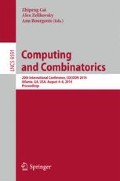Abstract
We give an AM protocol that allows the verifier to sample elements x from a probability distribution P, which is held by the prover. If the prover is honest, the verifier outputs (x,P(x)) with probability close to P(x).
In case the prover is dishonest, one may hope for the following guarantee: if the verifier outputs (x,p), then the probability that the verifier outputs x is close to p. Simple examples show that this cannot be achieved. Instead, we show that the following weaker condition holds (in a well defined sense) on average: If (x,p) is output, then p is an upper bound on the probability that x is output.
Our protocol yields a new transformation to turn interactive proofs where the verifier uses private random coins into proofs with public coins. The verifier has better running time compared to the well-known Goldwasser-Sipser transformation (STOC, 1986). For constant-round protocols, we only lose an arbitrarily small constant in soundness and completeness, while our public-coin verifier calls the private-coin verifier only once.
Access this chapter
Tax calculation will be finalised at checkout
Purchases are for personal use only
Preview
Unable to display preview. Download preview PDF.
References
Arora, S., Barak, B.: Computational Complexity - A Modern Approach. Cambridge University Press (2009)
Akavia, A., Goldreich, O., Goldwasser, S., Moshkovitz, D.: On basing one-way functions on NP-hardness. In: Kleinberg, J.M. (ed.) STOC, pp. 701–710. ACM (2006), See also errata on author’s webpage, http://www.wisdom.weizmann.ac.il/~oded/p_aggm.html
Aiello, W., Håstad, J.: Statistical zero-knowledge languages can be recognized in two rounds. J. Comput. Syst. Sci. 42(3), 327–345 (1991)
Babai, L.: Trading group theory for randomness. In: Sedgewick, R. (ed.) STOC, pp. 421–429. ACM (1985)
Babai, L.: E-mail and the unexpected power of interaction. In: Structure in Complexity Theory Conference, pp. 30–44. IEEE Computer Society (1990)
Babai, L., Moran, S.: Arthur-merlin games: A randomized proof system, and a hierarchy of complexity classes. J. Comput. Syst. Sci. 36(2), 254–276 (1988)
Bogdanov, A., Trevisan, L.: On worst-case to average-case reductions for NP problems. SIAM J. Comput. 36(4), 1119–1159 (2006)
Feigenbaum, J., Fortnow, L.: Random-self-reducibility of complete sets. SIAM J. Comput. 22(5), 994–1005 (1993)
Fortnow, L.: The complexity of perfect zero-knowledge. In: Structure in Complexity Theory Conference. IEEE Computer Society (1987)
Goldwasser, S., Micali, S., Rackoff, C.: The knowledge complexity of interactive proof systems. SIAM J. Comput. 18(1), 186–208 (1989)
Goldreich, O., Mansour, Y., Sipser, M.: Interactive proof systems: Provers that never fail and random selection (extended abstract). In: FOCS, pp. 449–461. IEEE Computer Society (1987)
Goldreich, O.: Computational complexity - a conceptual perspective. Cambridge University Press (2008)
Goldwasser, S., Sipser, M.: Private coins versus public coins in interactive proof systems. In: Hartmanis, J. (ed.) STOC, pp. 59–68. ACM (1986)
Goldreich, O., Vadhan, S.P., Wigderson, A.: On interactive proofs with a laconic prover. Computational Complexity 11(1-2), 1–53 (2002)
Haitner, I., Mahmoody, M., Xiao, D.: A new sampling protocol and applications to basing cryptographic primitives on the hardness of NP. In: IEEE Conference on Computational Complexity, pp. 76–87. IEEE Computer Society (2010)
Lund, C., Fortnow, L., Karloff, H.J., Nisan, N.: Algebraic methods for interactive proof systems. J. ACM 39(4), 859–868 (1992)
Shamir, A.: IP = PSPACE. J. ACM 39(4), 869–877 (1992)
Author information
Authors and Affiliations
Editor information
Editors and Affiliations
Rights and permissions
Copyright information
© 2014 Springer International Publishing Switzerland
About this paper
Cite this paper
Holenstein, T., Künzler, R. (2014). A Protocol for Generating Random Elements with Their Probabilities. In: Cai, Z., Zelikovsky, A., Bourgeois, A. (eds) Computing and Combinatorics. COCOON 2014. Lecture Notes in Computer Science, vol 8591. Springer, Cham. https://doi.org/10.1007/978-3-319-08783-2_17
Download citation
DOI: https://doi.org/10.1007/978-3-319-08783-2_17
Publisher Name: Springer, Cham
Print ISBN: 978-3-319-08782-5
Online ISBN: 978-3-319-08783-2
eBook Packages: Computer ScienceComputer Science (R0)

